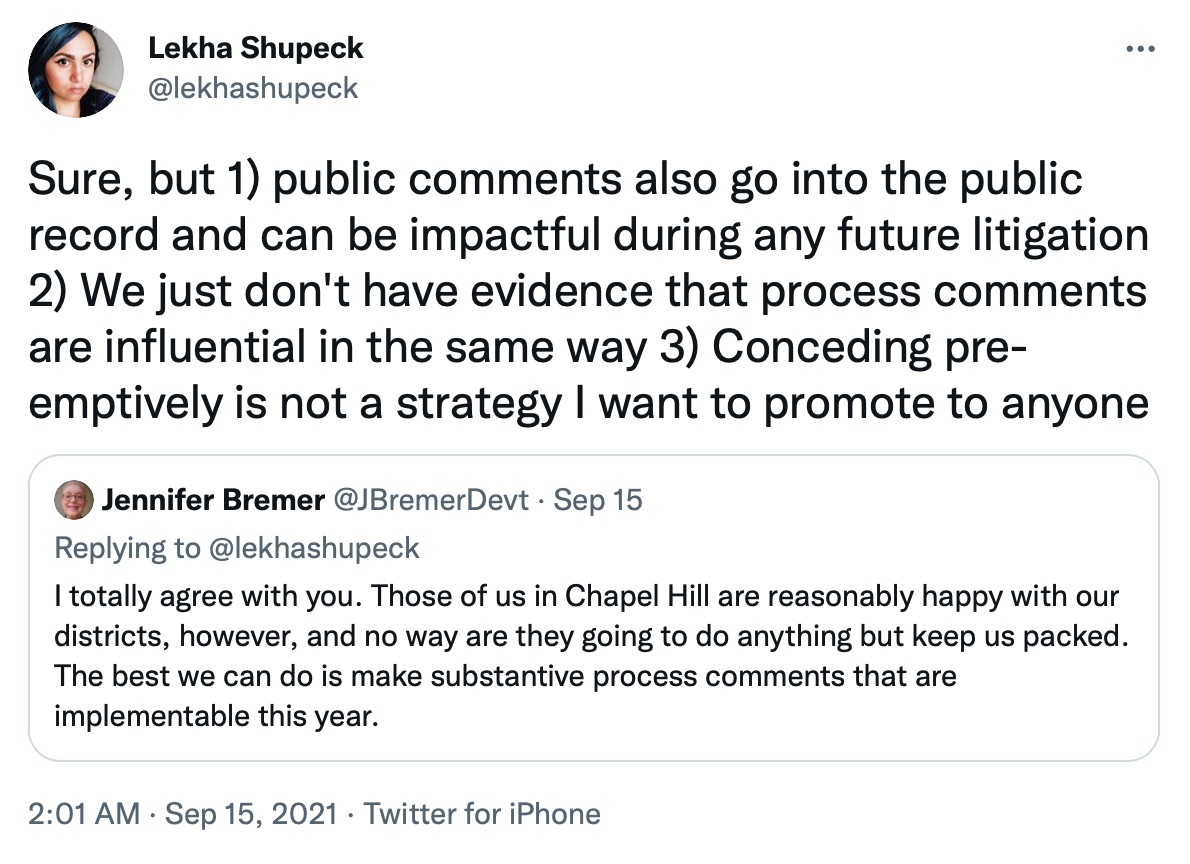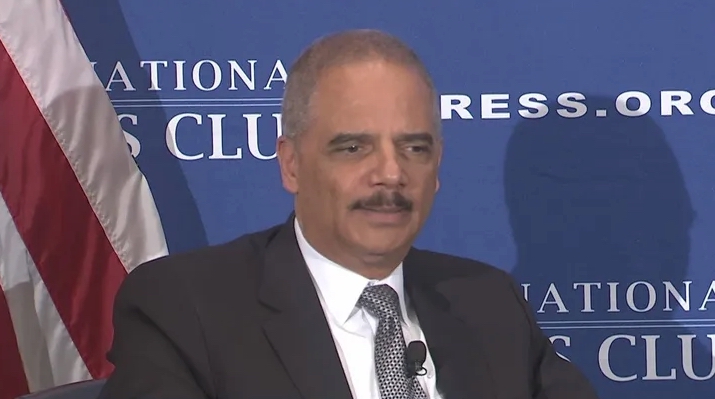- All On The Line, a program of Eric Holder’s National Democratic Redistricting Committee, is seeking to use public hearings as a way to assist in future litigation of district maps
- The General Assembly has several avenues for public comment on any bill, including district maps
- Further delaying elections, which have already been pushed back due to delays in the U.S. Census data, would either force municipalities to hold two elections or delay already overdue municipal elections in North Carolina’s major cities
After hosting 13 separate redistricting hearings across the state throughout September, the North Carolina General Assembly is beginning the process of drawing new legislative and congressional districts. Some groups are calling for the Redistricting Committee to implement an additional round of public hearings once the General Assembly has proposed new maps. While public comment is important in the legislative process, hosting another set of statewide public hearings would further push back North Carolina’s already delayed municipal elections. Pushing back North Carolina’s scheduled March elections would not only extend municipal incumbents’ terms even further but also harm voter participation in North Carolina’s primary elections.
Additionally, though the redistricting process has received extensive media coverage, a large majority of those providing public input at the hearings were either employed by or affiliated with political or partisan organizations.
“Sandbagging” public comments
Former U.S. Attorney General under the Obama administration Eric Holder’s redistricting grassroots program, All On The Line (AOTL), has partnered with many other left-leaning organizations across the state to organize and train speakers on how to participate and what kind of language to use for redistricting public hearings. They include the League of Women Voters, the NAACP, and various smaller progressive organizations.
AOTL has expressed its intent to use these public hearings as a tool for future litigation of North Carolina’s district maps. Their North Carolina state director, Lekha Shupeck, expressed on Twitter her concerns about the effectiveness of the comments that members of their coalition were providing and implored members to take part in AOTL training sessions. It is their wish for members of the public to offer specific comments on the districts into the public record that “Can be impactful during any future litigation.”
Tweet from All On The Line state director Lekha Shupeck calling for speakers at redistricting hearings to use language that would be “impactful during any future litigation”

Scripting public comment simply for evidence in future litigation goes against the very intent of these meetings. Sen. Ralph Hise, one of the chairs of the Redistricting Committee, cited the actions of Holder’s organization as “sandbagging” the public hearing process.
Moreover, Shupeck’s comments confirm that AOTL had already determined that they would challenge North Carolina’s maps — before they were drawn.
The General Assembly’s additional avenues for public comments
With a delay in census data pushing back the redistricting process, the public hearings may not be the most effective way for the committee to receive public input. Though public hearings are a traditional way for elected representatives to receive public input, it is by no means the only resource available for public comment. Members of the General Assembly frequently receive input on legislation and policy from the public through email and calls to their offices. Anyone can easily find and reach out to their representative and senator via the General Assembly’s “Find Your Legislators” tool.
Apart from the traditional outreach tools the public has available, the redistricting committees have also set up an online portal for public comment. All House and Senate redistricting committee members receive a copy of public inputs made using this system, all of which are part of the public record.
The site has been an effective tool for the redistricting committees, allowing them to receive thousands of public comments on the redistricting process — far above the number of comments they have received via the public hearings. According to AOTL, there were only around 440 public comments made during the in-person hearings throughout the state.
The cost of pushing back the filing deadlines
The delay of the 2020 U.S. Census data has already had a substantial effect on many local elections. Earlier this year, the General Assembly passed legislation allowing for the delay of the elections of more than 30 municipalities affected by the census data. This delay impacts some of North Carolina’s largest cities, including Charlotte, Greensboro, and Raleigh. It changes their election dates to no longer align with those of the other municipalities in their respective counties.
Should the General Assembly move the filing deadline back so that additional in-person hearings on the maps can be done, it would force municipalities into one of two situations. Either they would keep their municipal election dates set for March 8 and have a separate election for legislative and congressional races at a later date, or they would push municipal elections back again, further extending already extended terms in office for incumbents and creating significant voter confusion. Either option would likely drive down voter participation in those elections by moving the typical primary election day. Neither situation would be ideal for municipalities and those wishing for greater voter participation, as either case would significantly impact voter turnout.
With municipal elections already being delayed for many key cities in North Carolina, the General Assembly should not create further voter confusion by postponing elections. While the public needs input on legislative districts, 2020 has already shown that not everything needs to be done in an in-person meeting. The General Assembly has tools in place for the public to provide their input on redistricting through its traditional avenues, as well as the ones created specifically for this redistricting process.
No matter what districts are drawn or how transparent the process is, partisan actors have already indicated there will be lawsuits on the maps. Given this reality and that the public has numerous means to communicate with legislators about maps, there is no justification to delay the redistricting process further and potentially push back elections even farther.


